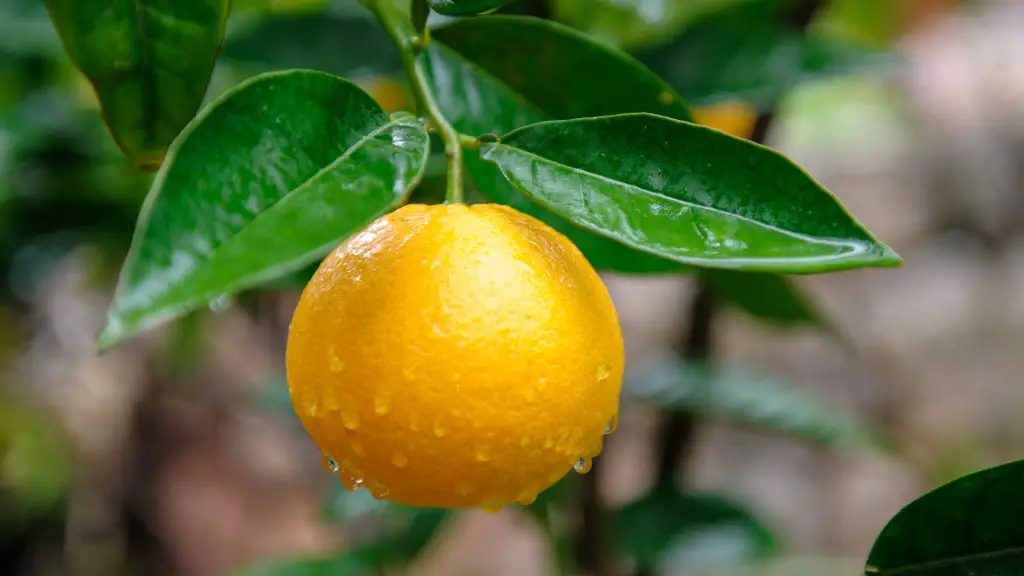When looking to plant a lemon tree, it’s important to understand the soil requirements. It’s important to pick the right soil mix in order to ensure tree growth and lemon production. A well-draining, loamy soil with some organic matter is ideal. The ideal soil type should have a pH level of 6 to 6.5. It should have a well-balanced ratio of nutrients and should provide good drainage. The ideal soil mix should contain equal parts of peat moss, sand, and composted organic matter. These combined ingredients not only provide the nutrients your lemon tree needs, but also helps retain moisture. It’s also essential to add some fertilizer, such as a balanced mix of 8-8-8, to help your lemon tree grow and produce fruit.
When it comes to watering your lemon tree, it’s important to keep the soil moist but not soggy. Generally, deep watering twice a week is enough. It’s also important to remember that lemons need full sun in order to thrive, so pick a spot in your garden or yard that gets 8 hours of direct sun each day. Mulching around the lemon tree helps preserve soil moisture and keeps away weeds.
While soil and sun are important, it’s equally important to remember that lemon trees need to be pruned and shaped. Proper pruning ensures a healthy lemon tree and also helps keep your lemon tree’s size manageable. For the most part, pruning consists of removing dead or damaged branches, cutting back overly vigorous growth, and shaping the tree for air circulation.
Lemon trees may suffer from a few common diseases and pests, so it’s important to inspect the tree regularly for any signs of trouble. If you notice any unusual growth or pests, it may be necessary to use a pesticide or fungicide.
Growing a lemon tree in your garden or yard can be a rewarding experience. It’s important to understand the soil requirements, watering needs, and pruning and pest control for a healthy tree. With the right knowledge and care, you can have an abundant crop of lemons each year.
Mulching For Lemon Trees
Mulching is an important part of growing a lemon tree. Mulch helps insulate the soil, keeps moisture in, minimizes weeds and retains nutrients. The type of mulch you use should depend on your specific soil. For example, if you have sandy soil, a mulch made from organic material like wood chips is ideal, while clay soil can benefit from shredded leaves, grass clippings or compost. The important thing is to use an organic mulch that won’t rot or blow away. If possible, spread a layer of mulch at least four inches deep and keep it at least twelve inches away from the trunk of the tree.
Fertilizing Lemon Trees
Fertilizing your lemon tree is important for healthy growth and lemon production. The type of fertilizer you use and the amount depends on the soil conditions. In general, a balanced combination of 8-8-8 works well for citrus trees, although you may need to adjust the ratios based on the soil test results. It’s important to wait until your lemon tree is established before applying fertilizer. Generally, the rule of thumb is to wait until after the tree’s first flush of blooms has come and gone. Once your tree is established, you can fertilize once or twice a year, in early spring and again in mid-summer.
Harvesting Lemon Trees
Harvesting lemons from a lemon tree is an exciting experience, but it’s important to know when to pick the lemons. Generally, lemons should be picked when they are ripe, which means they will be a bright, yellow color and they should feel slightly softened to the touch. For the best flavor, always wait until the lemons are ripe before harvesting. If you notice any sign of disease, like mold or discoloration, it’s important to remove those lemons promptly.
Storing Lemon Trees
If you are looking for a way to keep your lemon crop fresh until it’s time to use them, there are a few storage methods you can use. The most important thing is to keep the lemons dry and cool. For short-term storage, place the lemons in a single layer in a shallow container or in a paper bag in the refrigerator. For long-term storage, you can freeze your lemons. Place whole lemons in a zip-top bag or container and store in the freezer. When frozen, lemons will last for up to a year.
Protect Your Lemon Trees
Finally, it’s important to protect your lemon trees from pests and diseases. If you notice any insect pests, like aphids or scale, it may be necessary to use a pesticide or an insecticidal soap to help keep them at bay. If you notice any disease, like rust or canker, it may be necessary to use a fungicide. Lastly, if you live in an area with cold winters, you may need to cover your lemon tree or move it indoors to protect it from the icy temperatures.


